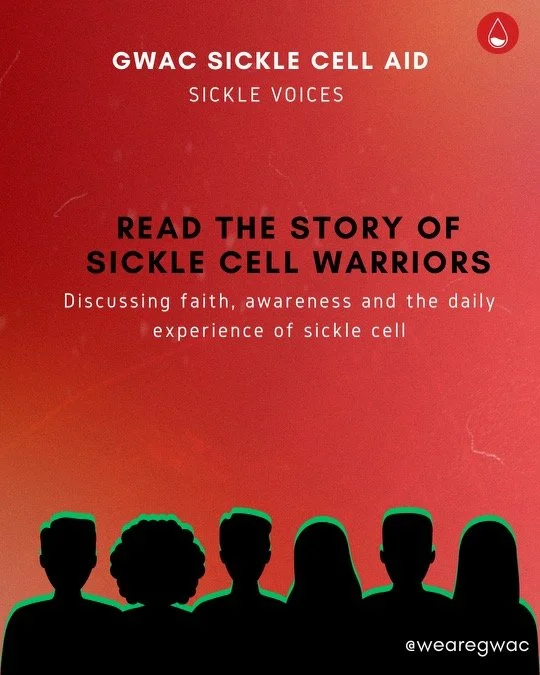Sickle Voices
Sickle Voices: Part 1 – KB’s Story
Welcome to the very first entry of GWAC’s “Sickle Voices”, a space dedicated to amplifying the lived experiences of people with Sickle Cell. Through this series, part of our GCOMM Project – Sickle Aid, we aim to shed light on the realities, challenges, and resilience of individuals navigating life with Sickle Cell.
For our first story, we meet KB, a 27-year-old Ghanaian living with a milder form of Sickle Cell (type CC). He shares openly about his experiences, struggles, and what he wishes more people understood about the condition.
Living with Sickle Cell
KB describes his type of Sickle Cell as mild, but it still has an impact on his daily life.
“Sometimes I feel pain in my muscles,” he says. “Because my type is mild, the pain isn’t constant, but it’s still part of my life.”
One of the biggest challenges KB has faced is the way Sickle Cell can lead to other health problems. “I developed gallstones because my sickled red blood cells break down much faster than normal. This constant breakdown produces extra bilirubin, leading to gallstones. I also experienced jaundice. The yellowing of my eyes was an important sign that my body was under stress and that something wasn’t right.”
Faith and Coping
When it comes to faith, KB admits it’s something he is still working through. “My faith isn’t there yet, so honestly I struggle. But when I was in hospital, I remember wanting to know more about God so I could have some sort of faith and lean on Him.”
Why Blood Donation Matters
For KB, blood donation is an essential topic when it comes to supporting people with Sickle Cell.
“It’s important for us to have more Black donors,” he explains. “It’s a better match as we are the ones that have it the most.”
While KB doesn’t need transfusions himself as a type CC, he emphasizes that donations can make a huge difference for others with type SC or SS. “It can help them manage their symptoms and improve their quality of life.”
Support and Awareness
In terms of healthcare, KB feels fortunate. “I haven’t been to the hospital for my Sickle Cell specifically, but when I had jaundice and gallstones I felt that the doctors were very supportive. They gave me as much information as possible and really tried to understand my pain.”
When asked about preventing crises, he shares advice from his father, who also carries the Sickle Cell trait. “My dad is type SC, and he always says drinking a lot of water is important. And it’s very helpful.”
KB also highlights the need for more education and awareness in schools, workplaces, and communities. “They should keep themselves updated and continue to spread awareness about Sickle Cell. Teaching people about the different types of Sickle Cell would make a big difference.”
Final Thoughts
KB’s story reminds us that while Sickle Cell affects people in different ways, it always requires understanding, awareness, and support. From recognizing early signs like jaundice to addressing the urgent need for more Black blood donors, his experience shines a light on issues that deserve more attention.
This is just the beginning of Sickle Voices. Stay tuned as we continue to share more personal stories, raise awareness, and build understanding around Sickle Cell.

